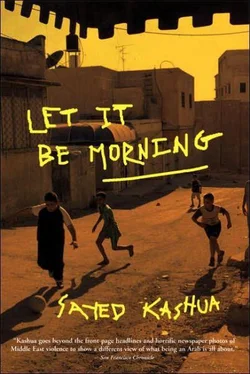She’s coming back into the bedroom now. I lie on my back with my eyes closed. She’ll be raising the blinds. She always pulls hard at the cord. It’s her way of telling me it’s time for me to wake up. I remember how I used to hope she’d find a different way of waking me. With a kiss, maybe, or maybe by stroking my hair, and maybe when I opened my eyes I’d also hear her “Good morning,” but those hopes were short-lived. She pulls hard at the aluminum blinds and furiously unleashes the sunlight that blasts me each morning with all its might. She thinks I’m only now waking up. I open my eyes, and I can see her standing over the bed. It must be almost seven. The alarm clock froze a long time ago. Sometimes it springs back to life and its hands suddenly advance by a few notches, only to stop again. Sometimes the second hand tries to climb up, and you can see it struggling to reach the next second, but it can’t. It tries for awhile, then gives up and stops short. She doesn’t really need an alarm clock anymore and we haven’t had to buy a new one. Every morning she’s the first to wake up, right on time, and she wakes up the rest of the household.
She’s wearing her dishdash, the kind all the Arab women wear. A black one with red and green embroidery near the top. I used to hate that dishdash and I thought that if she went to bed naked or with any other type of pajamas, a two-piece, maybe, everything would be so different, but she’s never parted with her dishdashes and there was no chance of her running out of them. Because almost every time her parents visited us, her mother made sure to bring along a new one. When the baby was born and her mother spent a few nights with us I discovered that she sleeps in a dishdash too. She crosses her arms, placing her right arm on her left hip and her left arm on her right hip, grabs the edges and, with one quick move, pulls it over her head.
Now she’s standing there in nothing but her undies, and I wonder as I watch her undress if I’ve ever been attracted to her. With one hand she stretches the skin of her back. The other arm is raised to let her look behind her from under her armpit and examine her backside. It’s a movement that repeats itself every morning, and I’ve never been able to figure it out. Why doesn’t she use the mirror damn it, just six feet away from the bed? The baby’s crying interrupts her movements and she quickly puts on her bra and runs to the baby’s room while hooking it with both arms behind her back. “What’s the matter, sweetheart? What’s wrong? Shhhh,” she calls out, and picks up the baby. I can picture her clasping the baby with one arm to the left side of her body, and the baby spreads her legs and encircles her mother’s stomach, hanging on to the white bra with both hands.
“Your bottle, you want your bottle, here’s your bottle.” She pours some warm water from the kettle into the baby’s bottle, takes some formula out of an upper cabinet in the kitchen and counts the spoonfuls out loud as if singing to the baby:
“Wahad, tneyn…” checking with her tongue to make sure the milk isn’t too warm, handing it to the baby, putting her back in her crib and returning to the bedroom to get dressed.
She pulls her pants up to her knees, then pulls one side up, struggling to get past her wide hips, then the other side. I’m always surprised to see how in the end her pants do close easily over her stomach. She puts on a white blouse I bought her when we were engaged. To tell the truth, I bought something else and took a receipt and she returned what I’d bought and chose a white button-down blouse with a collar shaped like two big triangles, like a butterfly’s wings. She pulls her sandals out from under the bed while trying to amuse the baby, and shouts from a distance, “Milk, you’re drinking your milk, Mommy’s coming, my pretty, you’re so pretty.” And she blurts out at me as she heads back from the bedroom to the baby’s room, “Well, what’s up, don’t you want any coffee? It’s seven-fifteen already.”
Iknow the paper didn’t arrive this morning either. For a few hours now I’ve been trying to concentrate, waiting to hear the paper being delivered. Maybe they’ll come on a bike, maybe by car. I’ve been waiting to hear the thud the paper makes as they hurl it at the front door, but I haven’t heard it. I go downstairs and try to turn on the TV with the remote, but nothing happens. The red lamp under the screen is turned off. This time I don’t even bother checking the fuse box. I know they’ve cut off our power too.
I can’t see the road from my house, but I can hear the commotion. “ Shu sar? What happened?” the neighbors are shouting from their windows, and the ones walking in the street shout back, “They’ve killed two people,” “They shot at people,” and “They must have caught some suicide bombers.” I tell my wife to stay home for now, and put on my pants and shirt and go to my parents’ place. They’re up too by now and are standing in the doorway that faces the street. Mother is clasping her hands together and cursing the Jews, and Father is puffing at his cigarette and saying that people say some workers were shot trying to get across the roadblock. My mother asks me not to leave the house. “What’s the point? What can you see out there anyway?” Their neighbor’s son, Khalil, who works as a nurse at the hospital in Kfar Sava, is returning in his car. My father signals him to come closer, Khalil parks outside his house and comes toward us in his white jacket. He had thought that if he approached the soldiers in his white jacket, they’d realize he was a nurse who wants to get to work. It’s just as well that he didn’t cross the roadblock, he says. There was a pickup there with a couple of workers in it. The owner, a contractor, tried to break through the barbed wire with his vehicle and took a tank shell. Just like that, no questions asked. He and the two workers died on the spot, and some of those behind the roadblock were hit by shrapnel. The Israelis didn’t send an ambulance and they wouldn’t let them be taken to hospital. The injured were picked up and taken to the infirmary. One of them was in a bad way — what could they do for him at the infirmary? He needs an operation urgently. The infirmary barely has a thermometer.
“And what’s going on now?” Father asks.
“The whole village is out there. The mayor and his cronies are asking people to move away and are trying to keep things quiet. The parents of the contractor and of the two workers, one of them from the village and one from the West Bank, are trying to get through with spades and knives, to get back at the soldiers. One worker’s father fainted and had to be taken to the infirmary too.”
“Maybe now they’ll get out to avoid a confrontation with the mob,” Father says, and Khalil, in his jacket, explains there’s no chance and that, on the contrary, they’ve been bringing more and more soldiers in, and they’re standing there with their pistols and their machine guns and the barrels of the tanks as if they’re expecting a war. “Allah yustur,” he says. “They’re up to something. What are they thinking? And they’ve cut off the power, to boot. They’ve gone completely crazy.”
“It could take time,” I tell my parents and my brother. “We’ve got to get things ready before it’s too late, to buy enough food for at least a week.”
For some reason, a week seems to me now like the longest that the thing everyone calls a roadblock — and nobody really knows if it’s a siege or a closure or the devil knows what — can continue. My father laughs and says I’m overreacting. My mother and my older brother agree with me. My brother says that, who knows, there might be confrontations with the soldiers and they’ll declare a closure, looks like they’ll stop at nothing now. I tell them they shouldn’t buy too many dairy products or too much meat or anything that needs to be refrigerated, because there’s no telling when the power will go back on.
Читать дальше












